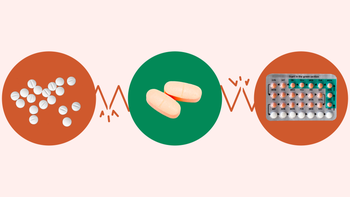
Depakene vs Depakote: What’s the Difference?
Key takeaways:
Depakene (valproic acid) and Depakote (divalproex sodium) are two very similar medications used to treat seizures. When talking about them together, healthcare professionals call these medications valproate products.
You shouldn’t switch between Depakene and Depakote without a healthcare provider’s OK. These medications are broken down differently and reach different levels in the body.
Depakene and Depakote are both available as lower-cost generics. You can find them for less than $25 at certain pharmacies with a free GoodRx discount.
Table of contents

Valproate. If you have a seizure condition, you’re likely familiar with this term. That’s because forms of valproate are commonly prescribed to treat seizures: Depakene (valproic acid) and Depakote (divalproex sodium).
But because you can’t switch between Depakene and Depakote (or their generic versions), it’s important to know which one you take.
In this article, we’ll discuss the differences between Depakene and Depakote and why they’re not interchangeable.
What is Depakene?
Depakene is the brand name for valproic acid. This medication comes as both an oral capsule and liquid. In the U.S., the brand name is no longer available. But people sometimes still use the word Depakene when talking about this medication because it’s easier to say.
What conditions is Depakene approved to treat?
Depakene is FDA-approved to treat different types of seizures caused by epilepsy. More specifically, it can be used for complex partial seizures and absence seizures. Depakene is approved to be used for adults and children ages 10 and older.
What is Depakote?
Depakote is the brand name for divalproex sodium. This medication is available as a delayed-release (DR) tablet, an extended-release (ER) tablet, and a DR “sprinkle” capsule. The sprinkle capsule gets its name from the fact that you can open the capsule and sprinkle it onto soft food. It’s a helpful option for people with trouble swallowing.
What conditions is Depakote approved to treat?
Depakote is FDA-approved for more conditions than Depakene. All forms of Depakote are approved to treat seizures in adults and children ages 10 and older. But the ER and DR tablets are also approved to treat manic episodes of bipolar disorder. The ER and DR tablets are FDA-approved for migraine prevention in adults as well.
How do Depakene and Depakote work for seizures?
Depakene and Depakote are antiepileptic (antiseizure) medications. It’s not fully understood how these medications work. Experts believe they help raise the levels of a chemical called gamma-aminobutyric acid (GABA). But it isn’t fully clear how higher GABA levels help with seizures.
The biggest difference between Depakene and Depakote lies in how the body breaks them down. Depakene is made of valproic acid only. Depakote is made by combining valproic acid and sodium valproate (another similar chemical) in a lab. When you take Depakote, your body will eventually break everything down to valproic acid.
But this difference in how the medications are broken down could make a difference in how well the medication works for you. Different dose forms reach different concentrations in the bloodstream — even if you take the same strength. There are rare reports that people have had more seizures when changing forms. This same issue has been seen when some people change between different manufacturers (e.g., going from brand to generic).
Because of this, it's important to keep taking the form that’s been prescribed to you. If you find you need or want to switch dose forms, discuss it with your healthcare provider. They may need to make dose changes when switching from one to another.
How are Depakene and Depakote dosed and given for seizures?
When used for seizures, the doses of Depakene and Depakote are based on your body weight. It may take some time to find the dose schedule that works for you. If you are taking more than 250 mg per day, it’s suggested that you take it in divided doses (more than once a day).
However, Depakote ER tablets are designed to only be taken once a day. The ER tablets have a special coating on them that allow for slower release of the medication. The ER tablets should be swallowed whole. Don’t cut, chew, or crush them.
As mentioned above, Depakote sprinkle capsules can be opened and sprinkled onto a small amount of soft food, like applesauce or pudding. The capsules can also be swallowed whole if preferred. If you do choose to sprinkle the medication, make sure to consume the medication and food immediately without chewing the mixture.
How effective are Depakene and Depakote for seizures?
Both Depakene and Depakote are similarly effective for treating seizures. These medications are particularly effective for absence seizures. In fact, they’re recommended as a first-choice option for these types of seizures in children.
There’s also evidence suggesting Depakene works well for tonic-clonic seizures. A small study compared Depakene to lamotrigine (Lamictal), another antiepileptic medication. Over 76% of those taking Depakene were seizure-free after a year of taking it. About 57% of those taking lamotrigine were seizure-free after the same amount of time.
It’s important to note that everyone has different experiences when it comes to finding the right seizure medication for them. Often, people need to try a few medications or combinations of medications before they find what works for them.
What are the known side effects of Depakene and Depakote?
Depakene and Depakote share similar side effects. However, stomach-related side effects are less likely to happen with Depakote.
| Side effect | Depakene | Depakote |
|---|---|---|
| Appetite loss | 15% | 6% |
| Nausea or vomiting | 17% | 7% |
| Upset stomach | 22% | 11% |
Other common side effects of both Depakene and Depakote include:
Headache
Stomach pain
Sleepiness
Dizziness
Low number of platelets
Weakness
Diarrhea
Tremors
Weight changes
What are the serious side effects of Depakene and Depakote?
Depakene and Depakote include a few FDA boxed warnings (the strictest warning the FDA can give). These side effects are rare, but they can be life-threatening if they happen.
Depakene and Depakote can cause liver damage or liver failure. This is most often seen during the first 6 months you’re taking these medications. Because of this risk, you’ll have to have regular blood tests done to make sure your liver is staying healthy. If you notice severe stomach pain, dark urine, or yellowing of the skin or eyes (jaundice), seek medical help right away.
Depakene and Depakote can also cause severe pancreatitis (swelling of the pancreas). In some cases, it can be fatal. If you experience sudden nausea, vomiting, severe stomach pain, and are unable to eat, contact your healthcare provider right away.
Depakene and Depakote shouldn’t be taken if you're pregnant. These medications are known to cause serious birth defects. If you become pregnant while taking these medications, let your healthcare provider know immediately. If you'd like to become pregnant, discuss other medication options with your provider before trying to get pregnant.
These aren't the only risks for Depakene and Depakote — just some of the most notable. Discuss the risks of these medications with your healthcare provider before starting either.
What interactions do Depakene and Depakote have?
Depakene and Depakote interact with many medications. Other antiepileptics can make these medications less effective. Examples include carbamazepine (Tegretol), phenobarbital, and phenytoin (Dilantin). You may still be able to combine these antiepileptics if needed, but you may need to take a different dose.
Depakene and Depakote also interact with:
Benzodiazepines, like clonazepam (Klonopin)
Felbamate (Felbatol)
Hormonal birth controls that contain estrogen
Topiramate (Topamax)
Warfarin (Coumadin, Jantoven)
These aren’t the only interactions for Depakene and Depakote. Some of the above medications affect how Depakene and Depakote work in the body. Others listed may be made less effective or more likely to cause side effects by Depakene or Depakote.
Ask your healthcare provider and pharmacist to double check for interactions before starting any new medications or over-the-counter supplements.
How to save on Depakene and Depakote
There are many ways to save on Depakene and Depakote. Both are available as lower-cost generic medications. But you can also find Depakote as a brand-name medication if your healthcare provider recommends it for you. GoodRx can help you navigate many ways to save on your prescription.
Save with GoodRx. GoodRx can help you save over 70% off the average retail price of the generic versions of Depakene and Depakote. Generic Depakene’s price and generic Depakote ER’s price at certain pharmacies are less than $25 with a free GoodRx discount.
Save with patient assistance programs. If you’re uninsured or underinsured, you may be eligible for Depakote’s patient assistance program, which offers the medication free of cost.
Save with a copay savings card. If you have commercial insurance and meet eligibility requirements, Depakote’s price is as little as $5 using a savings card from the manufacturer.
The bottom line
Depakene and Depakote are two similar medications used for treating seizure conditions. But switching between them could cause problems. That's because they are broken down differently in the body.
Depakene and Depakote share similar effectiveness, side effects, and interactions. Depakote may cause less stomach side effects than Depakene, though. Both are available as generic medications, helping to make them more affordable.
Why trust our experts?


References
Ajanta Pharma USA Inc. (2022). DIVALPROEX SODIUM - divalproex sodium capsule, coated pellets [package insert].
Aurobindo Pharma Limited. (2022). DIVALPROEX SODIUM - divalproex sodium tablet, film coated, extended release [package insert].
Epilepsy Foundation. (n.d.). Valproic acid.
Food and Drug Administration. (n.d.). Drugs@FDA: FDA-approved drugs.
Food and Drug Administration. (2015). Valproate information.
Giri, P. V., et al. (2016). Valproic acid versus lamotrigine as first-line monotherapy in newly diagnosed idiopathic generalized tonic –clonic seizures in adults – a randomized controlled trial. Journal of Clinical & Diagnostic Research.
Kanner, A. M., et al. (2018). Practice guideline update summary: Efficacy and tolerability of the new antiepileptic drugs I: Treatment of new-onset epilepsy. Neurology.
National Institute of Diabetes and Digestive and Kidney Diseases. (2019). Acute liver failure. LiverTox: Clinical and Research Information on Drug-Induced Liver Injury.
NorthStar Rx LLC. (2022). DIVALPROEX SODIUM - divalproex sodium tablet, film coated, extended release.
Pharmaceutical Associates, Inc. (2021). VALPROIC ACID- valproic acid solution [package insert].
Prescribers’ Digital Reference. (n.d.). Valproic acid - drug summary.
Rahman, M., et al. (2021). Valproic acid. StatPearls.
RemedyRepack Inc. (2022). VALPROIC ACID- valproic acid capsule [package insert].
Zarate, C. A., et al. (1999). The adverse effect profile and efficacy of divalproex sodium compared with valproic acid: A pharmacoepidemiology study. The Journal of Clinical Psychiatry.
Was this page helpful?
Related Articles
Browse medications
View AllResearch prescriptions and over-the-counter medications from A to Z, compare drug prices, and start saving.














